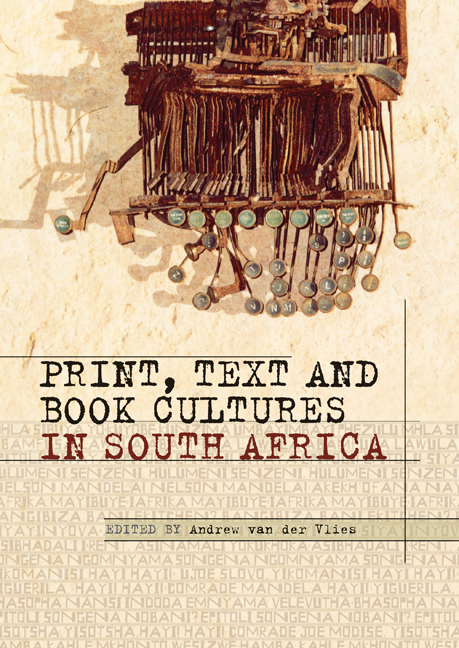Book contents
- Frontmatter
- Contents
- Acknowledgements
- Abbreviations and acronyms
- 1 Introductory
- 2 Print Cultures and Colonial Public Spheres
- 3 Local/Global: South African Writing and Global Imaginaries
- 3.1 Deneys Reitz and Imperial Co-option
- 3.2 “Consequential Changes”: Daphne Rooke's Mittee in America and South Africa
- 3.3 Oprah's Paton, or South Africa and the Globalisation of Suffering
- 4 Three Ways of Looking at Coetzee
- 5 Questions of the Archive and the Uses of Books
- 6 Orature, Image, Text
- 7 Ideological Exigencies and the Fates of Books
- 8 New Directions
- Contributors
- Index
3.1 Deneys Reitz and Imperial Co-option
from 3 - Local/Global: South African Writing and Global Imaginaries
Published online by Cambridge University Press: 21 April 2018
- Frontmatter
- Contents
- Acknowledgements
- Abbreviations and acronyms
- 1 Introductory
- 2 Print Cultures and Colonial Public Spheres
- 3 Local/Global: South African Writing and Global Imaginaries
- 3.1 Deneys Reitz and Imperial Co-option
- 3.2 “Consequential Changes”: Daphne Rooke's Mittee in America and South Africa
- 3.3 Oprah's Paton, or South Africa and the Globalisation of Suffering
- 4 Three Ways of Looking at Coetzee
- 5 Questions of the Archive and the Uses of Books
- 6 Orature, Image, Text
- 7 Ideological Exigencies and the Fates of Books
- 8 New Directions
- Contributors
- Index
Summary
Deneys Reitz's versions of his extraordinary memoir of the Anglo-Boer War provide a sharp and, as we shall see, complex register of self-understanding,1 colonial politics, violent subjugation and textual revision. Consider his two accounts of the negotiations preceding the Peace of Vereeniging, which brought about the formal capitulation of the Boers to the British in 1901. The 1903 version (originally in Dutch) reads:
I will not speak of the peace negotiations because, not being a delegate, I could not attend the meetings and, in consequence, I know nothing of the deliberations.
There were roughly seventy delegates altogether for the Transvaal and Free State. From the Transvaal there were present, amongst others, Generals Botha, De la Rey, Beyers and Kemp, my father (State Secretary), Schalk Burger (Vice-President), Louis Jacobsz (Assistant State-Attorney) and many other officers. From the Free State there were, in particular, President Steyn, Christiaan de Wet and Judge Herzog.
The men gathered here were the flower of our nation, all brave soldiers and as hard as iron—the “ultimi Romani”, I could say. There will never be a similar gathering of Afrikaners again; men who, for almost three years, had fought through thick and thin, through cold and hunger, under shell and bullet, against overwhelmingly superior forces and who were now standing as Schalk Burger said, “at the grave of the Republics” for which they had sacrificed everything.
When the final moment dawned, when it was announced that our land and freedom were lost, it was a bitter cup to drain. In the tents, grown men were sobbing like children. Weatherbeaten faces which had looked undaunted on the greatest dangers, streamed with hot tears of sorrow. These men who had stood with dry eyes at the graves of friends and sons and fathers now wept bitterly at the grave of their freedom. In truth it was a bitter hour.
I myself was lying behind a tent, grieving in the long grass when I felt a soothing hand on my shoulders. An Indian, who was a cook in the camp, was sitting next to me, also with tears in his eyes. He said over and over, “Baas, me very sorry—me very sorry”.
- Type
- Chapter
- Information
- Print, Text and Book Cultures in South Africa , pp. 110 - 120Publisher: Wits University PressPrint publication year: 2012



